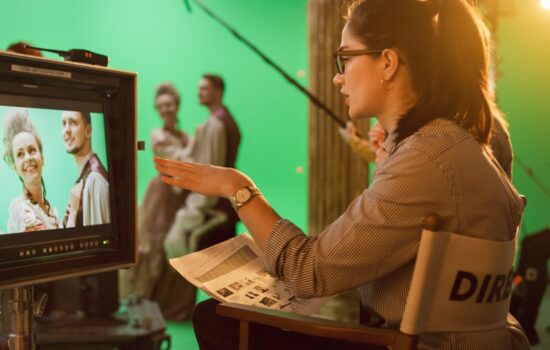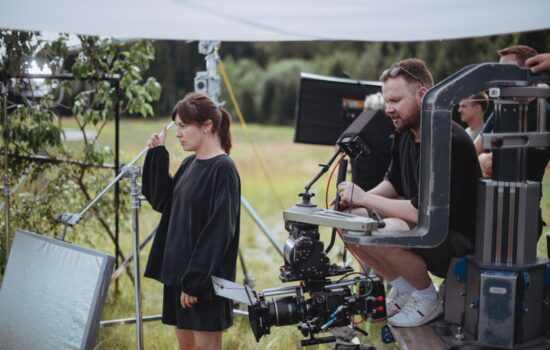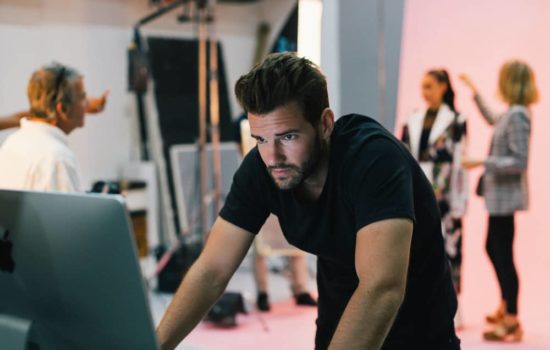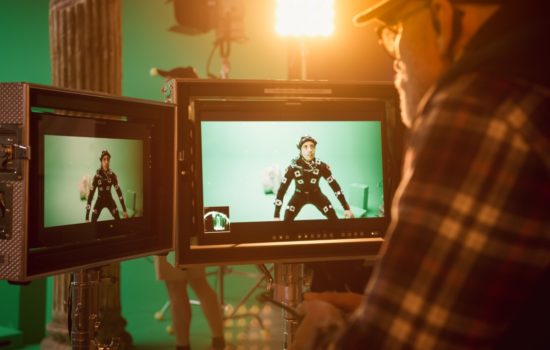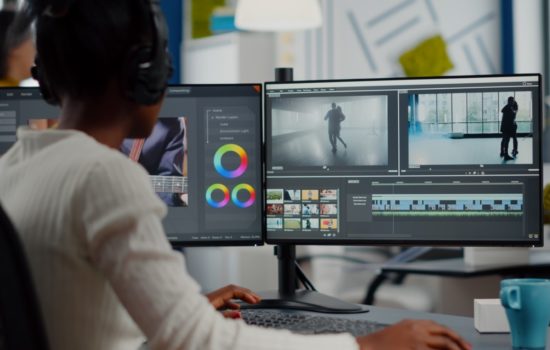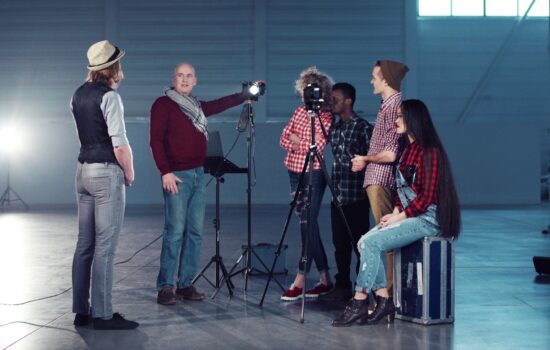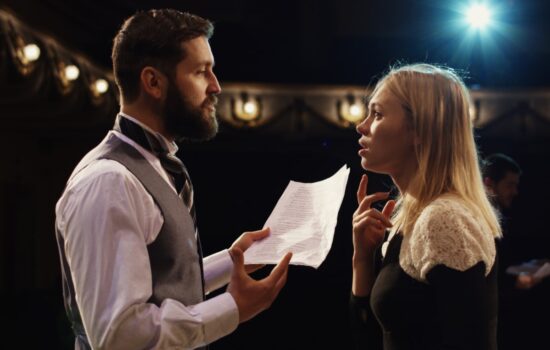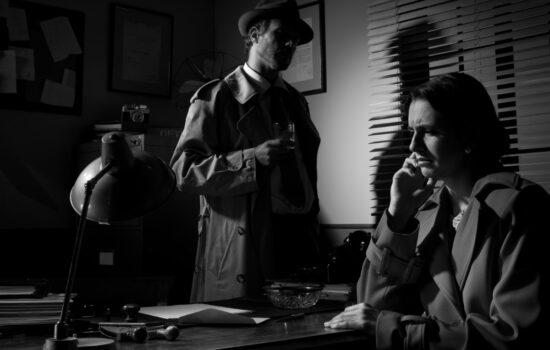Actress
Career Overview
Actresses collaborate with Writers and Directors to bring performances to life. They are an integral part of meaningful storytelling: bringing ideas to fruition, inhabiting characters and provoking thoughtful discussion through their craft.
Alternate Titles
Actor, Talent
Avg. Salary
$3M a picture1
Salary Range
$65K – $20M a picture1

How To Become an Actress
People also ask
Career Description
Michelle Lukes, a series regular on five seasons of HBO/Cinemax’s Strike Back, explains why any Actress or Actor is attracted to a role: “Most performers want to get material and put their stamp on it. We’re creative souls and part of why we’re drawn to this profession is because it provides an outlet for our voice and our play.
“Sometimes the role can be really alluring in itself, particularly if it’s a brilliantly written, deep character. Other times you can also enjoy being part of an intriguing, bigger picture and it’s fun to be a spoke in that wheel. It all just depends on the project and the Director.”
As an Actress, Lukes explains that she works very closely with Directors in all media: film, television, theater, voiceover, and games. She describes the dynamics at play: “I’ve worked with a lot of Directors and they come up from two different camps: they’re either creative people that have been Actresses/Actors or trained as such and progressed that way (we call them Actors’ Directors!), or they’re technical people who have been Cinematographers or ADs.
“The latter tend to see things more visually and work in the bigger picture, aesthetic dimension, whereas Actors’ Directors are more interested in your character, your performance, and your relationships. With more technical Directors on set, if you manage not to knock over the furniture, if you don’t fall over and trash the place, they’re happy and shout ‘Move on!’, even if you’ve turned in a shoddy performance.
“As an Actress, you really want to nail your performance and find the dynamics of the scene — that’s why we do it. I concede these are generalizations, but I tend to prefer Actors’ Directors!”
Lukes revels in the fantastic feeling when you get the job, but describes the next steps as very practical: “You usually have to travel somewhere to film and it’s all very short notice. You have to pack up your life and sort yourself out before you go. When I got Strike Back, I was living in London. I got the call on Wednesday and I had to be in South Africa on Saturday. That’s how quickly these things turn around.”
Even when it comes to doing the job on shoot day, time is no ally when working in television: “TV and film are very different. TV is very fast so there’s precious little prep time — you turn up on the day and you shoot. There’s hardly any rehearsal time. At best, you might get to run lines before blocking the scene but that’s not really ‘rehearsal.’
“For film, it’s a bit different. If I’m the lead in an indie movie, I’ll reach out to the Director for some creative preparatory work beforehand. In general, I like a bit of pre-shoot contact with Directors before I turn up on shoot day.
“Creatively speaking, in television, they send you the full script beforehand so you’re prepared for your first ‘table read.’ That’s the first time the Actors get together and just read the words in the script out loud with the Producers and Director.
“After that, there’s a dead period during which you’ll have costume fittings, or you may have to do weapons training or martial arts or physical training for any kind of specialized show, as was the case on Strike Back.”
What is the meaning of Actress?
Actress is typically the term used for a female Actor. However, the term Actor can be used to describe a performer of any gender.
Who are the top 10 female Actresses?
The top 10 female Actresses may differ according to the opinion of one person to the next. But currently, some of the most popular Actresses include:
- Scarlett Johansson
- Nicole Kidman
- Regina King
- Elizabeth Olsen
- Margot Robbie
- Kristen Stewart
- Emma Stone
- Charlize Theron
- Emma Watson
- Zendaya
Is it hard to become an actress?
It is, in fact, quite tough to become a successful actress. The entertainment industry is a crowded, competitive arena and very few (if any) roles are easy to find and maintain. But if you’ve got the desire to become an actress, here are a few things to keep in mind…
- Training and education
- Keep up with industry trends and standards
- Dealing with rejection
These are two things you can never get enough of in the film business (or most, for that matter). Constantly hone and sharpen your craft, whether that’s through classes, workshops, or participating in free work.
The film industry is constantly shifting and changing. Stay on top of all standards and expectations, whether that’s physical appearance, your network size, or acting range. Never stop researching what’s new out there.
As bitter a pill as it is to swallow, rejection is a big part of an actress’s life. Not every audition can land a role and you’ve got to keep a thick skin and stay resilient if you want to stay in the game.
Salary
Famous Actresses make anywhere from $65K to $20M a picture.
Actresses are self-employed so earnings correlate directly with the amount you work. Lukes reminds us of the only certainty in the entertainment industry: “Agents and Managers take a percentage-based commission from your earnings. It’s anywhere between 10-20%. I work on the assumption that 20% of your income is going to your representation.”
Hey, what do you think about trying our new Film Career HelperFilm Career Helper really quick? It’s totally free and could help get your career moving fast! Give it a try. It’s totally free and you have nothing to lose.
Career Outlook
Lukes explains that she tries to find work/life balance, but it can be tough: “If I’m shooting something where I live, I make time to connect with people outside of my work. If you’re on location, you’re living and working with the same people for intense and prolonged periods of time so I do try and find time for me. I horsehide or do yoga or I write; I find those things nourishing and important.
“I like to travel if I’m on location because you’re already in a place you might not otherwise have the opportunity to visit so if I get a few days off, I go out for little adventures. It’s good to take a step back in your downtime because acting can be all-consuming.”
Career Path
For Actresses, building any upward career trajectory involves the weekly grind of castings and “booking.” When it comes to the practical business of auditions, Lukes says she gets an email the day before a casting and her Agent will send a breakdown of the project. This includes a list of the Writers, Casting Directors, Casting Assistants, Producers, Directors, Armorers, etc., and a general plot-line.
The email will also include a three or four line character breakdown, just enough for a performer to build an idea of the role for which they’re preparing. The bigger the role, the more information and scenes they give you. Lukes explains how this works:
“There are different levels of role — there’s a series regular, characters that you know and come to love over the course of an entire series. Then there are recurring roles, characters that appear in a handful of episodes in a season.
After that, we have guest stars that appear in one or two episodes, and then co-star day players who come in for those smaller, one-or-two line roles in the episode. For the audition, they send ‘sides,’ the pages you will read for the Casting Director.
“I audition regularly for a lot of series regulars so, on average, I’ll have to prepare five or six meaty scenes. It’s nice because there’s plenty to get your teeth into. If you’re preparing a guest star role, you have fewer scenes and it can be harder to get real meaning out of it.”
Lukes laments the lack of time to prepare, particularly for television auditions: “There’s never enough time so you have to shape your process around those constraints. I like to be, at least, familiar enough with the lines so I’m not married to the script, but I’m not one for learning the lines completely. That comes later.”
“The most important thing is to understand the reason for the character, what part of this story am I telling, how am I integral to it. That’s fundamental. If it’s available, I read the whole script for context so I’m making accurate choices, then I pull as much detail as possible from the stage directions and begin to build my dramatic beats.”
“With the luxury of time, I’d do more, but we normally only get a night to prepare. I do like to read with a real human before I’m in the audition room so I’m not performing it cold for the first time in there.”
Even if you nail an audition, perhaps twice or three times, there are still hurdles to jump; Lukes outlines the “testing” process: “‘Testing’ is when you’ve done a few rounds of auditions and callbacks and they’ve significantly narrowed down the pool of Actresses for the role. You are then taken to the network to read in front of all the executives who are in charge of the final decision.”
“When you go in to test, your contracts are drawn up prior to that so the network knows exactly how much you will be costing them if you book the role! Once you’ve been a series regular, you have a ‘quote’ which becomes your minimum moving forward. Let me be clear: the range of that ‘minimum’ is extremely wide — there are people doing the same level of role on the same show, yet there are vast discrepancies in their pay.”
Lukes talks about wanting to develop more of her own work now that she has had such rich experience in the entertainment industry: “I would love to be more creative these days; I need that outlet. I’m beginning to explore creating my own work and I’m definitely attracted to directing. On a theatrical level, I’d love to create an amazing, immersive theatre experience, even if it’s only a small scale to start with.”
At the entry-level, working Actors and Actresses will be taking on regular co-star and guest star roles. However, working at that level comes with complications that Lukes lays out straight: “If you’re a co-star or guest star, and not a series regular, it can be quite intimidating coming on to a set where everyone knows each other.”
“They know how everything works, they know their characters, the writing. To come in as an outsider, it can be tough to find your feet. In TV, you don’t get the time to find your footing at all. Co-stars and guest stars rarely get the chance to go that second or third time. You might not have worked for a few months and you’re thrown in the deep end and you have to nail that performance.”
“It’s not easy to do in your one and only take. Conversely, if you’re a series regular, and you’re getting up at 04:30 for weeks on end, it can be really exhausting — it’s challenging to stay on your game. You also have to deal with the politics and dynamics of a set. To come in fresh and ready consistently can be tricky.”
In terms of making money outside of acting, Lukes contends it’s tough to maintain a full-time career: “You get an audition across town for the following day and you need to take three hours out of your work? Or you book a job and you have to leave for a month? It’s not easy to find (and keep) a job where you have the freedom to do that.”
Lukes also has advice for those who will make up the majority of the acting community: “Unless you’re in that 0.5% of actors who do not stop working, you will have significant periods of downtime. You need to find something else that fulfills you outside of acting, something that feeds your creative drive.”
“Actresses choose this profession because we love it, so when we’re not doing it, something is missing. That’s why it’s important to find another skill or hobby or craft that is meaningful to you. Yes, you have to make money, but you must find something for your soul.”
- “Work breeds work, so say ‘yes’ at the beginning. And create your own stuff. It helps to have a body of work to show people; people aren’t interested in your resumé, they want to see your work. Do what you can when you’re starting out because it’s all experience. You can learn when to say ‘no’ later on down the line.
- There are online sites like Actors Access [and] even IMDB Pro that advertise work you can apply for without having an Agent. You’ll find useful, entry-level work on these sites and it’s the kind of work in which you can experiment and play.”
Who is the most famous female Actress?
Every era has seen rise and fall the popularity of a particular Actress. But if looking back at the history of entertainment – especially since the introduction of film and television – some Actresses have retained their popularity long after the height of their fame.
The most famous female Actress will certainly vary from person to person, but individuals such as Katharine Hepburn and Meryl Streep generally are mentioned on account of the acclaim they had and continue to have over the course of their careers.
Experience & Skills
Beyond your formal training, Lukes encourages anyone to begin building a repertoire of tools that help you grow and perform more comfortably. She talks about understanding your own body: “I think it’s really useful to have a strong sense of your physicality. I’m an ex-Dancer and I worked for several years in musical theater on the West End. I think having that physical awareness has really helped me adapt to certain jobs.
“For example, it helps with the motion capture I do for video games, and when playing a Special Forces Soldier, I had to be able to use my body in certain ways. Every role will require you to understand and inhabit your body in different manners so anything that activates that awareness will really help. Even sport is a great way for people to get in touch with their bodies more.”
Lukes dives deeper into experiences and techniques that may be less ‘obvious’ to any aspiring Actresses: “For me, sensory things work very well to prepare me for my work. Music affects me deeply so I put in my earphones and listen to whatever I need. If I have a big scene ahead of me in the day, I arrive in the morning and I’m already in the zone.
“There are people who can jump in and out of emotionality but I’m not like that. I’ll take quiet time alone, I’ll not chat, I’ll not be ‘fun Michelle’! And the music isn’t always as simple as ‘sad music for sad scene’ — sometimes I’m exhausted and I have to shoot a sequence running across the African savannah with a machine gun and I need a boost. Music gives me that!”
The acting industry has space for every kind of person — there is no such thing as a “type.” However, there are traits that Lukes highlights as useful for anyone looking to build a serious acting career. The first is patience:
“There can be a lot of waiting — you might have a 04:00 call and you have your makeup done and you’re prepped for a big emotional scene and then four hours later they’re still not ready. Or they won’t even get to you that day! Or they’ll be ready right at the end of the day and have to rush you through before light fades.”
This leads Lukes to the second personality trait worth developing: a thick skin. “You do have to learn not to be precious about things. I remember my death scene after five seasons of Strike Back — it was the culmination of my journey on that show and it was important to me to do a worthy job.
“We shot it and it went swimmingly and I nailed it. Then two weeks later I get a knock on my dressing room door and they told me the camera in the car was too shaky and the footage was unusable. I had to suck it up and reshoot the whole lot. There really is no room for delicate flowers in this industry!”
On that note, Lukes makes clear that a career in acting comes with significant challenges to your self-worth: “You can do 100 auditions and get 100 ‘no’s’. Or 99 ‘no’s ‘and 1 ‘yes.’ Your self-esteem is going to be challenged but you can’t let this work be a reflection of your worth. It’s all subjective.
“You may not get a job because you’re not the right age or nationality or they think you look funny or whatever it may be. Don’t make assumptions about why you don’t book jobs. Acting mustn’t be your be-all and end-all — that’s when it stops being fun. The most interesting people, including Actresses, are those leading full lives.”
How do I become an actress with no experience?
Becoming an actress with no experience can certainly be a challenge but it’s not impossible. If you’re determined this is the career path for you, it’s best to form a plan. Here are some ways to put one together…
- Consider the type of acting you want to do
- Learn and research
- Get headshots
- Network
- Audition
- Create a reel
- Get repped
Whether that’s film, tv, or plays, go where your passion is. Ensconce yourself in that particular niche and learn all you can about it.
Study acting, whether that’s in mediums like plays, film, and tv or attending school and/or workshops. Immerse yourself in the acting world.
Headshots are a necessity for an actor’s portfolio; you can’t get anywhere as a performer without them.
A key to just about every industry is meeting people in your field and making connections. Check out the local film festivals and look for industry-related meetups.
Look for community theater, independent films, or student productions. The pay most likely won’t be great (if at all), but the important thing is getting some experience on your resume.
Assemble your best performances into one montage. Try to display as broad a range as possible while still showcasing your competency at the craft.
Once you’ve gotten your headshot and have built a reel demonstrating your talent, find an agent and/or manager to represent you and seek out auditions you’d be right for.
Education & Training
Lukes recommends anyone considering acting as a career to explore all the training options available. She explains: “Training teaches you the discipline needed, the business needs and how to be in professional relationships with other performers. It’s very important to find a style of training that resonates with you; there are so many out there.”
“Beyond that, take what’s useful to you and discard the rest. There are too many ‘gurus’ out there and Actresses begin to lose their intuition by relying on these people. So, do train, but be selective and make sure it’s not prescriptive because taking acting classes does not equal a good Actress.”
Lukes has worked with several Coaches and recommends Tim Philips, Sheila Gray and Lesly Kahn.
She says, “Lesly is huge here in LA and she has a lot of Actors working; she’s worth checking out. Sheila comes from a very theatrical, method background. It’s very sensory work and I enjoy that, but you don’t necessarily have the time for that level of preparation in television.”
What training or education do I need to become an actress?
Although there’s a lot of on-the-job training when it comes to being an actress, getting a formal education in performing could prove to be an essential component of your acting career.
Research local acting workshops; they’re a terrific way to stay busy, develop your skills, and meet fellow actors. Larger institutions are more costly but they too can help develop skill as well as create new professional connections. Acting is a process and there’s always more to learned and discovered from it.
Here are several of the top acting schools in the country along with some of their most noteworthy alumni. You could do a lot worse than a background in performing from any of these schools…
- Yale
- The Juilliard School
- NYU Tisch School of the Arts
- University of North Carolina School of the Arts
- Guildhall School
Now known as the David Geffen School of Drama at Yale University boasts an alumni list of Meryl Streep, Angela Bassett, Paul Giamatti, Sigourney Weaver, and Liev Schriber among many others.
Some of Julliard’s most famous alumni are Robin Williams, Viola Davis, Val Kilmer, Andre Braugher, and Ving Rhames.
A few standout alums from New York University’s acting school include Phillips Seymour Hoffman, Angelina Jolie, Jeffrey Wright, Julie Benz, and Bridget Fonda.
Mary Louse Parker, Anthony Mackie, Danny McBride, Anna Camp, and Jada Pinkett Smith are all notable alumni of UNCSA.
Daniel Craig, Hayley Atwell, Ewan McGregor, Lily James, and Alfred Molina all attended Guildhall.
Additional Resources
For Actresses, the representative groups dominating the industry are Agents and Casting Directors. As Lukes points out, “They are, unfortunately, the gatekeepers of our industry. It’s not at all conducive to making art, but that’s the reality and you do need an Agent to get anywhere significant.”
Nonetheless, Lukes has some advice for anyone at the beginning of their career: “When I started out, I accepted representation from a huge agency and, in hindsight, I’m not sure that was the right choice for me. I’m much more positive about the way I chose my Manager; I went on to IMBD Pro and found working Actors and Actresses doing a high standard of work.
“I found out who was repping them and I contacted them. With bigger agencies, they have huge clients, stars, and they’re the ones earning the Agents their money so they focus on them. In the end, you have to shop around and find someone who is excited about you and your work.”
The union for performers is SAG-AFTRA and Lukes has some insightful thoughts about how to navigate union membership at the beginning of your career: “Yes, our union is useful at a certain stage but it’s expensive to join and if you’re not working regularly enough, you won’t qualify for healthcare benefits.”
“You also won’t be able to audition for non-union work, of which there is plenty. Your pool of work becomes smaller and the pool of Actors is of higher quality so be careful about when you join. Of course, join when it is right for you, but don’t rush.”
FAQ
What is the single biggest suggestion you would give to someone wanting to get into this career?
“Don’t put all your eggs in one basket. Diversify. I think you need to have a life outside of acting and you need to develop skills beyond the industry. It’s dangerous to go all in or bust. Have a backup plan.”
What’s the #1 mistake people make when trying to get into this career?
“On set, I treat everyone with respect, no matter who they are in the perceived hierarchy. I see inexperienced Actors and Actresses coming in and being very disrespectful. You’re lucky to have a job, lucky to be on set, so be grateful for it. Enjoy it fully, but don’t take it for granted.”
What is the question people should ask about this career but rarely do?
“I didn’t realize how much of being an Actor is not about acting. If you’re thinking about going into acting, a very small percentage of it is still about the craft. It’s a business, so, like it or not, you need to go in with your eyes open. It’s about networking, social media, headshots, everything like that.”
If you could describe in one word what makes you successful, what would it be?
“Resilience.”
Sources
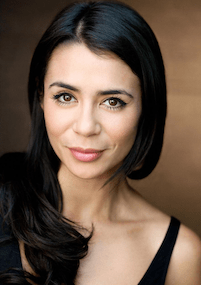
Michelle Lukes
Michelle Lukes is a mixed-race British actress from London. She trained at Bristol Old Vic and graduated in 2007, winning the Newton Blick award for versatility. Michelle is best known for playing series regular Sgt. Julia Richmond in the HBO/Sky production Strike Back, and Lisa Torres in the BBC drama Doctors.
Her voice and image were recently used for Halo 5: Guardians, where she plays the much-loved role of Kelly.
Michelle comes from a theatre background and has had numerous stage roles for the RSC, National Theatre and Salisbury Playhouse. Before Drama School, she spent a few years in London’s West End in musical theater. Michelle is an accomplished dancer, singer and she also plays the piano.
Her work on Strike Back has been covered by The Chicago Tribune, Deadline, Wall Street Journal, and The Philadelphia Inquirer.
References
- 1THR Staff. "Hollywood's Salary Report 2017: Movie Stars to Makeup Artists to Boom Operators". The Hollywood Reporter. published: September 28, 2017. retrieved on: April 9, 2020
